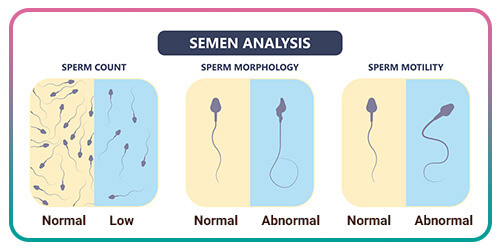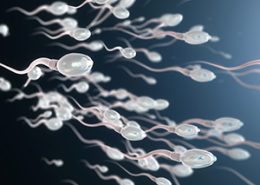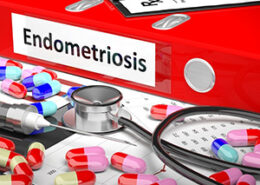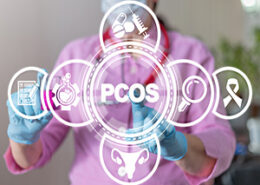What are the causes of male infertility?
If the couple does not become pregnant after one year of regular and unprotected intercourse, it is necessary to refer to a specialist to check the causes of infertility problems. This period is six months to investigate the causes of infertility in women over 35 years. Approximately one in seven couples has infertility problems. Infertility in couples is not limited to infertility problems in women, and about half of all infertility cases are related to fertility problems in men. Male infertility can have different causes. Timely follow-up and necessary tests can help diagnose and treat infertility problems in men and increase the chances of pregnancy in couples. Learn more about fertility tests in men: Diagnostic Tests for Male Infertility

Common causes of male infertility
About one-third of infertility cases are due to a male problem, and the other one-third are due to a combination of male and female problems. Male infertility has different causes Varicocele, sperm disorders, hormonal disorders, blockage in the sperm transfer tubes, retrograde ejaculation, lack of testicular exit, genetic disorders, sexual disorders, etc. can lead to infertility in men. Many infertility problems in men can be treated with timely diagnosis and appropriate treatment. Common causes of male infertility include the following:
-
Varicocele:
An enlargement of the testicle’s blood vessels is called varicocele. Varicocele is the most common cause of infertility in men, occurring in 40% of men with infertility problems. Although the exact cause of infertility in men with varicocele is not known, an abnormal increase in testicular temperature due to varicocele may be the main cause. The increased testicular temperature has a negative effect on sperm production and quality and causes infertility problems in men. Varicocele is asymptomatic in most men, but in some, it can cause testicular pain when sitting or exercising. Learn more about varicocele: Varicocele; Causes and treatment
A specialist will usually check for testicular varicocele by examining and performing an ultrasound of the testicles. If varicocele affects a man’s fertility, a specialist doctor will treat it with surgery. Timely treatment of varicocele can improve the number and quality of sperm and increase male fertility. Men with varicocele are more likely to have a normal pregnancy after surgery, but in some cases, your doctor may recommend assisted reproductive techniques such as IUI, IVF, and ICSI for pregnancy.
-
Problems with making healthy Sperm:
Sperm health is one of the factors affecting male fertility. The number, amount of motility, and natural shape of sperm are the most important criteria for determining sperm health. Sperm problems can be caused by hormonal disorders, damage to the genitals, certain diseases, genetic disorders, exposure to heat, or exposure to certain chemicals and toxins. This problem usually has no specific symptoms and can only be detected by performing a sperm analysis test.

In some cases, sperm health is improved by following some strategies to increase sperm quality and improve lifestyle. But in some cases, a specialist doctor will prescribe tonics to treat sperm problems. These drugs help to produce quality sperm. If normal pregnancy does not occur with medication, your doctor may recommend assisted reproductive procedures such as IUI, IVF, and ICSI.
In some cases, infertility in men can occur due to the lack of sperm in the semen, which is called azoospermia. Nowadays, with the advent of new surgical methods to extract sperm from testicular tissue such as TESA, PESA, and micro-TESE, many men with azoospermia can conceive using their own sperm. But in cases where azoospermia occurs due to a lack of sperm production in the testicles, the only way to have children is to use donated sperm. Learn more about azoospermia: Azoospermia: Treatment, Causes, Symptoms
-
Hormonal Disorders:
Dysfunction of the hypothalamus, pituitary, thyroid and adrenal glands disrupts the balance of hormones in the body and can cause infertility problems in men. Testosterone is the most important hormone that affects testicular function. Lack of testosterone in the body impairs testicular function and reduces sperm production and libido in men. Decreased testosterone levels can be caused by a testicular infection, the use of certain medications, certain underlying diseases such as diabetes, obesity, and AIDS, high levels of the hormone prolactin in the body, and genetic diseases such as Klein-Felter syndrome. Doctors usually use testosterone supplements to treat this complication.
-
Blockage of Sperm Transport Tubes:
Sperm cannot be transported out of the genital tract if the fallopian tubes are blocked for reasons such as surgery, infection, trauma, or certain diseases, such as fibrocystic or genetic factors. Therefore, the presence of an obstruction in the seminal vesicles prevents sperm from reaching the egg and causes fertility problems in men. Obstruction can occur in any part of the genital tract, such as the testicles, epididymis, or urinary tract. Obstruction of the sperm transfer tubes can usually be treated with surgery.
.
-
Retrograde ejaculation:
Retrograde ejaculation occurs when semen enters the bladder instead of leaving the penis during ejaculation. In this case, sperm will not come out of the penis to fertilize the eggs. Factors such as bladder muscle weakness, diabetes, infection, spinal cord injury, congenital malformations, taking certain medications, and a history of bladder surgery etc. can cause the problem of retrograde ejaculation. People with retrograde ejaculation usually have turbid urine and a small amount of semen comes out of their penis during sexual intercourse. Your doctor may recommend surgery to treat this problem. If the problem of reversible ejaculation is not resolved with surgery, the doctor will perform special surgery to remove sperm from the testicular tissue and treat fertility problems using assisted reproductive techniques such as IUI, IVF, and ICSI.
-
Undescended testis:
The testicles, like all organs of the body, grow during the embryonic period and eventually protrude from the abdomen and are placed inside the scrotum. If one or both testicles do not come out of the abdomen during the fetal period, testicular dysfunction occurs. This complication is most common in premature infants, affecting 30% of preterm infants and 3% of full-term infants.
Failure of the testicles to drop into the scrotum can cause infertility problems in men. If this complication is treated in infancy, the risk of infertility and testicular cancer decreases at older ages.
-
Genetic disorders:
Some genetic disorders, such as Klein-Felter syndrome, fibrocystic disease, Kallmann syndrome, and Kartagener syndrome, can cause infertility problems in men.
-
Sexual dysfunction:
Erectile dysfunction, premature ejaculation, painful sex, structural abnormalities in the reproductive system, and mental problems etc. are among the sexual dysfunctions that can cause infertility in men.

-
Production of anti-sperm antibodies:
One of the causes of infertility in men is the production of antibodies in the male body that work against sperm. These antibodies are the cells of the immune system that recognize sperm as the enemy and try to destroy them. Anti-sperm antibodies disrupt the function of sperm and reduce their motility and fertility. These antibodies are more common in men who have had a vasectomy or have a blockage in the spermatic tube. A specialist doctor will usually recommend IVF or ICSI to treat infertility in these men. In some cases, medicines are prescribed to suppress antibodies that are not recommended for long-term use.
-
Getting some diseases:
Infection can cause infertility in both males and females. Infections such as orchitis (infection of the testicles), inflammation of the epididymis canal (epididymitis), and sexually transmitted infections such as gonorrhea, syphilis, and HIV can disrupt sperm production or reduce its quality and quantity. Although some infections cause permanent damage to the testicles, sperm can often be extracted by PESA, TESE, and micro-TESE and fertilized in the laboratory. Learn more about testicular sampling for male infertility treatment: Testicular Biopsy for Azoospermia
Also, Celiac disease can be a cause of male infertility. It is a digestive disorder that causes gluten sensitivity. Celiac disease is often cured with a gluten-free diet.
Genital cancers are also one of the causes of infertility in men. Chemotherapy and radiation therapy, which treat other cancers, also affect male fertility and sperm quality.
Taking some drugs such as steroids, antifungal drugs, stomach ulcer drugs, etc., can also disrupt sperm production and reduce male fertility.
-
Surgical history:
Some surgeries, such as vasectomy, hernia surgery, prostate surgery, and abdominal surgery, can disrupt sperm production or cause ejaculation problems. Therefore, a history of such surgeries can be a cause of infertility in men.
-
Inappropriate lifestyle:
Improper lifestyle is one of the factors influencing the incidence of infertility problems in men. Proper nutrition, regular exercise, a balanced weight, avoidance of smoking and alcohol, adequate sleep, and stress management greatly impact increasing sperm quality. On the other hand, exposure to chemicals and heat, and prolonged sitting, weakens testicular function and reduces sperm production and quality (Read more about the factors influencing the incidence of infertility problems in men).
How does obesity affect male fertility?
Male Infertility has different causes; one of the important causes is obesity and overweight. Obesity affects male fertility in different ways.
Obesity directly affects the structure and tissue of the testes and affects the process of sperm production by changing the number, motility, and shape of sperm and causing damage to sperm DNA.
In addition, obesity causes a decrease in sex drive, hypogonadism, and hormonal changes, all of which negatively affect male fertility.
Therefore, to treat infertility in overweight and obese people, it is recommended to change their lifestyle and follow a healthy and appropriate diet. In addition, exercising and being active help these people a lot in removing the complications of obesity.
How is male infertility treated?
Nowadays, with the advancement of science and new technologies, there are many ways to treat infertility in men. The choice of a proper treatment method depends on the cause and severity of infertility. Many infertility problems in men can be treated with hormonal medications and supplements. These drugs help to produce good quality sperm and increase their number and motility. In cases where varicocele infertility is caused by obstruction of the seminal vesicles or retrograde ejaculation, corrective and reconstructive surgery can help alleviate infertility problems.

If infertility in men is not treated with medication or corrective surgery, the specialist will remove the sperm from the testicular tissue by performing PESA, TESA, or micro-TESE surgery. These sperm are tested in a laboratory, and quality sperm are selected. Selected sperm fertilize the eggs and assist in fertilization by assisted reproductive techniques such as IUI, IVF, or ICSI.
In some cases, infertility in men may occur due to the lack of sperm production in the testicles. In this case, the only way to have children is to use donated sperm. Contact us for more information on male infertility treatment.
If you’re dealing with male infertility or unsure about your sperm test results, you don’t have to face it alone. Our online male fertility consultation offers expert review of your medical reports, personalized advice, and treatment guidance — all from the comfort of your home.









